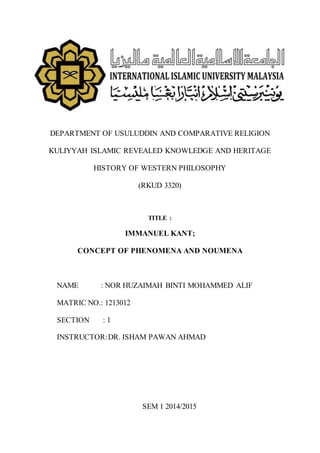
IMMANUEL KANT, CONCEPT NOUMENA AND PHENOMENA
- 1. DEPARTMENT OF USULUDDIN AND COMPARATIVE RELIGION KULIYYAH ISLAMIC REVEALED KNOWLEDGE AND HERITAGE HISTORY OF WESTERN PHILOSOPHY (RKUD 3320) TITLE : IMMANUEL KANT; CONCEPT OF PHENOMENA AND NOUMENA NAME : NOR HUZAIMAH BINTI MOHAMMED ALIF MATRIC NO.: 1213012 SECTION : 1 INSTRUCTOR:DR. ISHAM PAWAN AHMAD SEM 1 2014/2015
- 2. Kant’s Concept of Noumena and Phenomena. According to Kant, human knowledge is forever limited. The limitation divided into two. First, knowledge is limited to the world experience. Second, our knowledge is limited by the manner in which our faculties of perception and thinking organize the raw data of experience. According to Kant, it is vital always to distinguish between the distinct realms of phenomena and noumena. Phenomena is the world as we experience it. The world that we can perceive by our senses, such as touch, smell, see, hear and taste. It also limited to our experience and physical. For example, when we look at a shirt, then we just can see the solid shirt. Noumena reality is the real world as it is, purely intelligible, that is nonsensual reality. Eventhough we use the better intrument such as microscope and telescope to see it, we still cannot achieve to see the real world. For example, when a shirt was put under the microscope lens, we can see there are many threats and also space between them. But, in the real world as we experience we does not see the space in our shirt, therefore we just pick and wear. Another example is, television. As we can see from our senses, the picture inside the tv just clear, but when we come to see near to the tv screen, there are so many pixel. Therefore, the better picture that we can see from the tv screen was the combination of the pixel. But we still did not know the real how many pixel that should the tv has. Because we corncern on phenomena, we deal as there is no noumena. It is because noumena is we can never perceived the ultimate reality but we can only know its existance. By applying the pure form of sensible intuition and the pure concept of the understanding, we achieve a systematic view of the phenomena realm but learn nothing of the noumena realm.
- 3. Human knowledge is limited. Kant first dealt with the faculty of intuition. Here the primary question that corncerned Kant was not “What is perception” nor “Is perception possible?” Rather, it was “How is perception possible?” That is, he began with the commonsense view that we do perceive the world and asked what conditions must hold for that to be possible. For example, he wanted to know how it was possible that we are able to utter sentences about the Matterhorn if the empiricists were right to say we never perceive space, only sense data. And he wanted to know how it was possible that we are able to utter the true sentences about the amount of time it takes to get to the Berlin if the empiricists were correct to say we never perceive time, only sense data. Kant’s solution was to demonstrate that space and time are the synthetic a priori foundations of the faculty of perception. An posteriori sentence like “the cat is on the mat” presupposes the truth of the sentence “Object exist in the space and time”. According to Kant, we sometimes know the first sentence to be true, yet it cannot be true unless the second is also true. The latter is not analytic and it is not a posteriori (there is no sense datum of space or time- Hume was right about that), so it must be a synthetic a prior truth.
